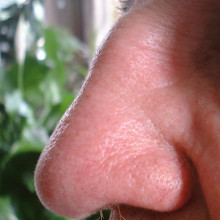This week, we find out if our noses tell us the truth.& Does a strong smell mean a lot of odour in the air, or can we be tricked by small smells?& In short, does our sense of smell have a sense of scale?& Also, we ask if more carbon dioxide in the air leads to bigger caves in the ground, and can you slow the growth of your hair by not having it cut?
In this episode

00:00 - Size of Smell Sense?
Size of Smell Sense?
Greg Jefferies, Medical Research Council Laboratory of Molecular Biology:
The simple answer to that is yes and I'll try and explain a little bit about why that is.
So if you're thinking about some signal in the outside world, there are two steps probably that you could divide the process up into. The first is actually taking the signal and turning it into an electrical signal inside your body and the second is the brain then processing it and telling you about it. So we'll call the second step perception and we'll assume that you're really interested in this signal. What's going to determine how sensitive to the signal you are is really this detection step, this sensory detection step. What you have are specialised detectors at the top of the nose. These are protein detectors and the way they actually signal a smell is that a smell consists of odour molecules diffusing about in the air. They come up to the top of the nose and bind to these protein receptors. Now they don't just bind to any oldreceptor. There's sort of a lock and key fit between the smelly molecule and the receptor. So if you don't have receptors which can fit with a particular molecule then you won't smell it. Now over time, evolutionary time that is, we've acquired receptors that fit very well with odour molecules that we might be interested in. One example of a smell that we're very sensitive to it is mercaptan that's put in natural gas, so that we can detect a gas leak. It takes only one part per billion, even less than that, for us to actually detect that smell. So, to put that in another context, that's more or less the same as three drops of smell in the volume the size of an Olympic swimming pool, and we could detect that. Of course there are plenty of other odours to which we're much less sensitive. So the questioner is quite right that there are some smells which we are very sensitive to.
- Previous Frosty Roofs, Rocks from Space and UK Quakes
- Next Virtual Life










Comments
Add a comment